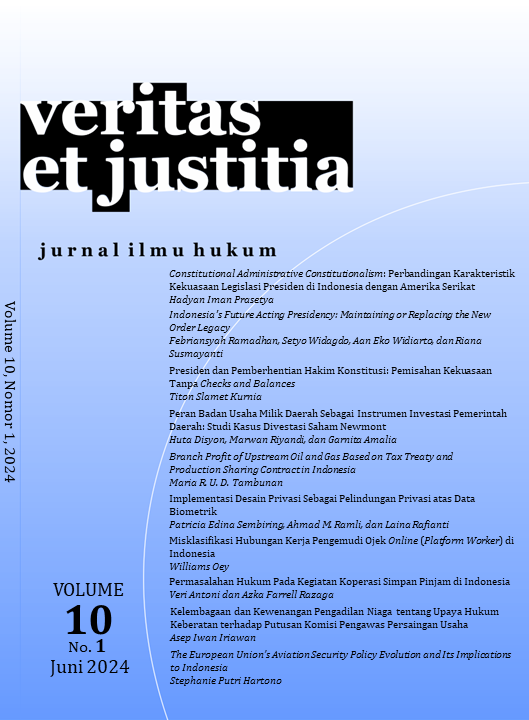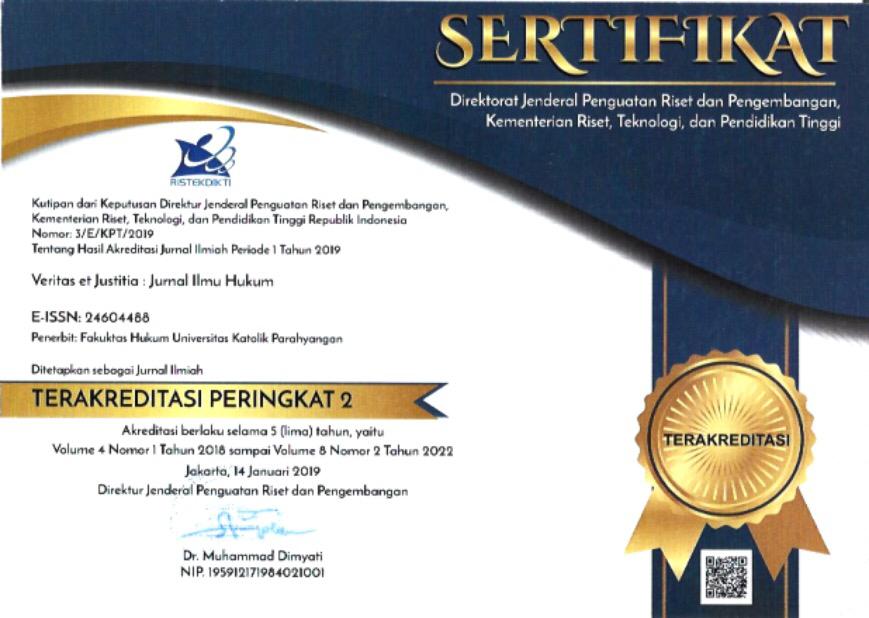CONSTITUTIONAL ADMINISTRATIVE CONSTITUTIONALISM: PERBANDINGAN KARAKTERISTIK KEKUASAAN LEGISLASI PRESIDEN DI INDONESIA DENGAN AMERIKA SERIKAT
DOI:
https://doi.org/10.25123/vej.v10i1.7220Kata Kunci:
administrative constitutionalism; executive branch; indonesia’s presidential legislative powerAbstrak
Recent studies conducted by American legal historians show that constitutional interpretation in the United States (U.S.) often arises from administrative agencies, a phenomenon called administrative constitutionalism. This supports the executive branch’s constitutional interpretation power, independent from the court. Similarly, Indonesia’s Constitution grants the President legislative power. By comparing this with U.S. administrative constitutionalism, this article, written descriptively through normative approach, examines the Indonesian President’s legislative power, termed constitutional administrative constitutionalism. The findings highlight three characteristics: (1) the U.S. dichotomy between president and administration does not apply in Indonesia, (2) Indonesia’s checks and balances occur during the debates in legislation drafting phase, unlike the post-enactment review in the U.S., and (3) Indonesia’s system operates under judicial supremacy, unlike the contesting judicial supremacy-departmentalism-popular constitutionalism in the U.S.
Referensi
Buku:
Jimly Asshiddiqie, Konstitusi & Konstitusionalisme Indonesia, Sinar Grafika, Jakarta, 2010.
Maria Weimer dan Anniek de Ruijter (eds.), Regulating Risks in the European Union: The Co-production of Expert and Executive Power, Hart Publishing, Oregon, 2017.
Mark Tushnet et.al (eds.), The Oxford of the U.S. Constitution, Oxford University Press, Oxford, 2015.
Michael W. McConnell, The President Who Would Not Be King: Executive Power under the Constitution, Princeton University Press, New Jersey, 2020.
Nicholas R. Parrillo (ed.), Administrative Law from the Inside Out: Essays on Themes in the Work of Jerry L. Mashaw, Cambridge University Press, London, 2017.
Richard W. Bauman dan Tsvi Kahana (eds.), The Least Examined Branch: The Role of Legislature in the Constitutional State, Cambridge University Press, Cambridge, 2006.
Rudy, Konstitusionalisme Indonesia (Buku I, Dasar & Teori), Pusat Kajian Konstitusi dan Peraturan Perundang-Undangan (PKKPUU), Fakultas Hukum Universitas Lampung, 2013.
Saikrishna Bangalore Prakash, Imperial from the Beginning: The Constitution of the Original Executive, Yale University Press, Connecticut, 2015.
Saldi Isra, Pergeseran Fungsi Legislasi: Menguatnya Model Legislasi Parlementer dalam Sistem Presidensial Indonesia, Rajagrafindo Persada, Jakarta, 2010.
Sulardi, Menuju Sistem Pemerintahan Presidensial Murni, Setara Press, Malang, 2012.
Jurnal:
Abdul Bari Azed, Mewujudkan Sistem Presidensial Murni di Indonesia: Sebuah Gagasan Penyempurnaan Sistem Ketatanegaraan Indonesia, 5 Legalitas 44, 69-76, 2013.
Bayu Aryanto, Susi Dwi Harijanti, dan Mei Susanto, Menggagas Model Fast-Track Legislation Dalam Sistem Pembentukan Undang-Undang di Indonesia, 10 Jurnal Rechtsvinding 187, 198-202, 2021.
Dian Kus Pratiwi, Muhammad Addi Fauzani, dan Ahmad Ilham Wibowo, Potensi Pengaturan dan Praktek Pembentukan Undang-Undang Secara Cepat di Indonesia (Studi terhadap Pembentukan Revisi Undang-Undang tentang Komisi Pemberantasan Korupsi dan Undang-Undang Mahkamah Konstitusi), 19 Jurnal Legislasi Indonesia 502, 502-517, 2022.
Bertrall L. Ross II, Embracing Administrative Constitutionalism, 95 Boston University Law Review 519, 528-529, 2015.
Bertrall L. Ross II, Administrative Constitutionalism as Popular Constitutionalism, 167 University of Pennsylvania Law Review 1783, 2019.
Cary Coglianese dan Gabriel Scheffler, What Congress’s Repeal Efforts Can Teach Us about Regulatory Reform, 3 Administrative Law Review Accord 43, 2017.
Daniel Cohen dan Peter L. Strauss, Congressional Review of Agency Regulations, 49 Administrative Law Review 95, 1997.
Elena Kagan, Presidential Administration, 114 Harvard Law Review 2245.
Gillian E. Metzger, Administrative Constitutionalism, 91 Texas Law Review 1897, 1906, 2013.
Ibnu Sina Chandranegara, Pengadopsian Mekanisme Fast-Track Legislation Dalam Pengusulan Rancangan Undang-Undang Oleh Presiden, 21 Jurnal Penelitian Hukum De Jure 123, 123-140, 2021.
Jeremy K. Kessler, The Administrative Origins of Modern Civil Liberties Law, 114 Columbia Law Review 1083, 2014.
Jeremy K. Kessler, New Look Constitutionalism: the Cold War Critique of Military Manpower Administration, 167 University of Pennsylvania Law Review 1749, 2019.
Joanna L. Grisinger, Municipal Administrative Constitutionalism: the New York City Commission on Human Rights, Foreign Policy, and the First Amendment, 167 University of Pennsylvania Law Review 1669, 2019.
Karen M. Tani, Administrative Equal Protection: Federalism, the Fourteenth Amendment, and the Rights of the Poor, 100 Cornell Law Review 825, 2015.
Karen M. Tani, Administrative Constitutionalism at the “Borders of Belonging”: Drawing on History to Expand the Archive and Change the Lens”, 167 University of Pennsylvania Law Review 1603, 2019.
Katherine Shaw, State Administrative Constitutionalism, 69 Arkansas Law Review 527, 2016.
Kirti Datla dan Richard L. Revesz, Deconstructing Independent Agencies (and Executive Agencies), 98 Cornell Law Review 769, 2013.
Saikrishna Bangalore Prakash, Hail to the Chief Administrator: The Framers and the President’s Administrative Powers, 992 Yale Law Journal 991, 1993.
Sophia Z. Lee, Race, Sex, and Rulemaking: Administrative Constitutionalism and the Workplace, 1960 to the Present, 96 Virginia Law Review 799, 801, 2010.
Sophia Z. Lee, Our Administered Constitution: Administrative Constitutionalism from the Founding to the Present, 167 University of Pennsylvania Law Review 1699, 1705, 2019.
Suwarno Abadi, Finality of Indonesian Constitutional Court Decision in Regard to Judicial Review, 28 Mimbar Hukum 174, 2016.
William N. Eksridge, Jr. dan John Ferejohn, Super-Statutes, 50 Duke Law Journal 1215, 2001.
Situs Daring:
Elliot Bulmer, Presidential Legislative Power, International Institute for Democracy and Electoral Assistance (International IDEA), 2017, https://www.idea.int/sites/default/files/publications/presidential-legislative-powers-primer.pdf .
Administrative Office of the U.S. Courts, About Supreme Court, https://www.uscourts.gov/about-federal-courts/educational-resources/about-educational-outreach/activity-resources/about#:~:text=The%20best%2Dknown%20power%20of,Madison%20(1803).
Philip A. Wallach dan Nicholas W. Zeppos, How Powerful is the Congressional Review Act?, The Brookings Institution, 2017, https://www.brookings.edu/articles/how-powerful-is-the-congressional-review-act/.
##submission.downloads##
Diterbitkan
Terbitan
Bagian
Lisensi
Hak Cipta (c) 2024 Hadyan Iman Prasetya

Artikel ini berlisensi Creative Commons Attribution-NonCommercial 4.0 International License.
Authors who publish with this journal agree to the following terms:
Authors retain copyright and grant the journal right of first publication with the work simultaneously licensed under a Creative Commons Attribution License that allows others to share the work with an acknowledgement of the work's authorship and initial publication in this journal.
Authors are able to enter into separate, additional contractual arrangements for the non-exclusive distribution of the journal's published version of the work (e.g., post it to an institutional repository or publish it in a book), with an acknowledgement of its initial publication in this journal.
Authors are permitted and encouraged to post their work online (e.g., in institutional repositories or on their website) prior to and during the submission process, as it can lead to productive exchanges, as well as earlier and greater citation of published work.
The Journal allow the author(s) to hold the copyright and to retian publishing rights without restrictions.










